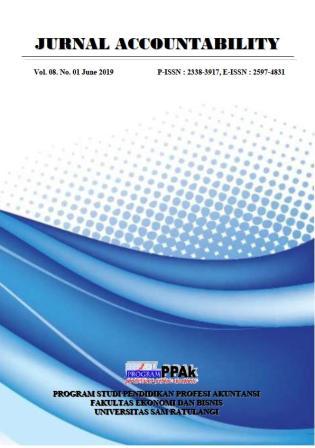INTELLECTUAL CAPITAL IN PUBLIC SECTOR
Keywords:
intellectual capital, physical capital, human capital, structural capital, financial performanceAbstract
This study explores the way in which intellectual capital characteristics contribute towards a competitive advantage to public sector firms, particularly–State Owned Enterprises (SOEs) in Indonesia. The purpose of this study was to investigate the relationship between the intellectual capital and performance of public sector firms. Another purpose was to find out the difference of SOEs and non SOEs listed on Indonesian Stock Exchange regarding the effect of intellectual capital on financial performance The motivation based on the opinion that public sector in Indonesia had a bad performance compares to private sector. In government context human capital include competence, level of knowledge and integrity. Structural capital consist of culture and system or bureaucracy. Customer capital pertaining services to public. The sample consist of 36 firms were listed in Indonesia Stock Exchange, 18 SOEs and 18 non SOEs. Data were drawn for three years, 2010-2012. It was an empirical study using multiple regression model and independent sample t test for the data analysis. The paper tests elements of VAICTM and financial company’s performance. The findings show that: as partial, the components of intellectual capital (VAICTM), physical capital have a significantly influences to firms performance, but human capital and structural capital have no significantly influences to firms performance.
Downloads
Published
Issue
Section
License
The articles published in Jurnal Accountability are licensed under Creative Commons Attribution-NonCommercial 4.0 International with authors as copyright holders.
Â

This work is licensed under a Creative Commons Attribution-NonCommercial 4.0 International License.
Â
- Share — copy and redistribute the material in any medium or format.
- Adapt — remix, transform, and build upon the material.
- The licensor cannot revoke these freedoms as long as you follow the license terms.
- Attribution — You must give appropriate credit, provide a link to the license, and indicate if changes were made. You may do so in any reasonable manner, but not in any way that suggests the licensor endorses you or your use.
- NonCommercial — You may not use the material for commercial purposes.
- No additional restrictions — You may not apply legal terms or technological measures that legally restrict others from doing anything the license permits.
- You do not have to comply with the license for elements of the material in the public domain or where your use is permitted by an applicable exception or limitation.
- No warranties are given. The license may not give you all of the permissions necessary for your intended use. For example, other rights such as publicity, privacy, or moral rights may limit how you use the material.



